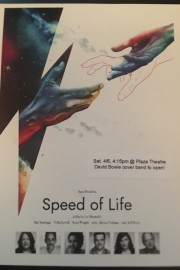Speed of Life
**I watched “Speed of Life” as part of the 2019 Atlanta Film Festival. I will actually have a longer interview with writer-director Liz Manashil later in the week that I hope you check out.**
“Speed of Life” has fantastical elements in it, but it’s fundamentally, at it’s heart, about a couple figuring out they may not be for one another. And it takes the death of David Bowie for them to realize that. This is a narratively simple, but emotionally complicated, story, and I’ll always respond to that.
Writer-director Liz Manashil’s film has a hook in it that feels like someone should have done it before, and I’m sure that, if I thought about it enough, I could come up with another film that does it. But if one does exist, I don’t know that it would have had the emotion behind it this does to explore what happens when, at a critical moment in a relationship, one half of the couple disappears, only to come back at another crucial moment. Already I’ve got different films coming to mind, but none of them are quite like this.
The film begins with an argument between June (Allison Tolman) and Edward (Ray Santiago) the night David Bowie died in 2016. Actually, it begins with a young June, in 1992, putting one of Bowie’s iconic face lightning bolts on her face in a bathroom; this sets the tone for her character’s love of Bowie, but more than that, it feels like a personal touch put in by Manashil reflecting a scene that she played out in her young life. Back to the argument, it is a garden-variety fight between a couple that seems ready to break at any time, which starts out about something small, and then builds to something bigger that basically everyone has had when they’re in a relationship. This one has a unique ending, however, when Edward suddenly disappears through a rip in the universe that opens up in their house. We then cut to 2040, and June (played now by Ann Dowd) is nearly her 60th birthday. The world has changed, but she still lives in that house, with a friend (Jeff Perry) who lives next door, and whom is urging her to run away with her before her 60th birthday before being shipped off in government living. (The world has really changed.) There’s also Laura (Vella Lovell), her friend’s daughter, whom visits every couple of days, and we see that she has some of the same spirit that June has. Ultimately, though, June has shut herself off from a radically-different world, wondering where Edward went to, keeping others at arm’s length. Suddenly, Edward returns, and he looks the same as when he left. June’s simple life becomes complicated again, and she needs some answers. So does Edward.
This film would not work without us being invested in both June and Edward, and it’s one of the strengths of Manashil’s film that she has us engaged by both parts of the argument in the beginning, which is also a credit to Tolman and Santiago, along with Manashil’s writing. This is a film that feels very personal for the writer-director in every way- from the characters to how Bowie is loved by June, and how it feels like her life is split in two after his passing, and Edward’s disappearance. We empathize with June greatly, and Dowd picks up the character Tolman began to develop and shows how the years have changed her, while she remains fundamentally the same. When Edward returns, she is not sure what to make of it, but she certainly does not feel like it’s a coincidence. How many of us wouldn’t want another chance to interact with someone in our life we lost at a particular time, whether it was just through the passage of time or because they disappeared from our life in another way? I’m sure all of us could say yes to that, and we’d love say something we never got to say, or do something differently. June has that opportunity, and she isn’t going to waste it.
There are sci-fi elements in the film that are interesting expansions of what we see in real life now, and the idea of just shelving seniors of a certain age is smart social commentary, but the relationship between the characters is what we are left with after the film is done. That’s all we need from this lovely and thoughtful for it to resonate.











I also saw this film in Atlanta. It deserves to be seen. I laughed out loud several times as did the whole theater. Briefly met the director. I’m rooting for her. She wrote a funny story that leaves you thinking a bit about life. Someone distribute this thing. I’d see it again.
THANK YOU LYNN!!!